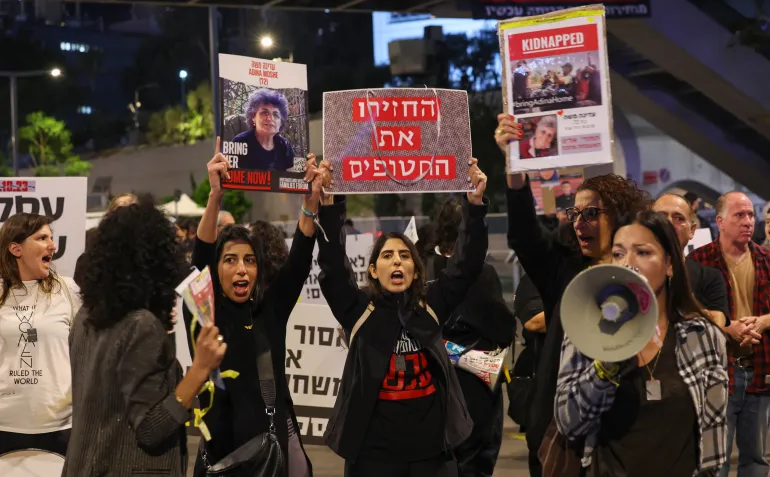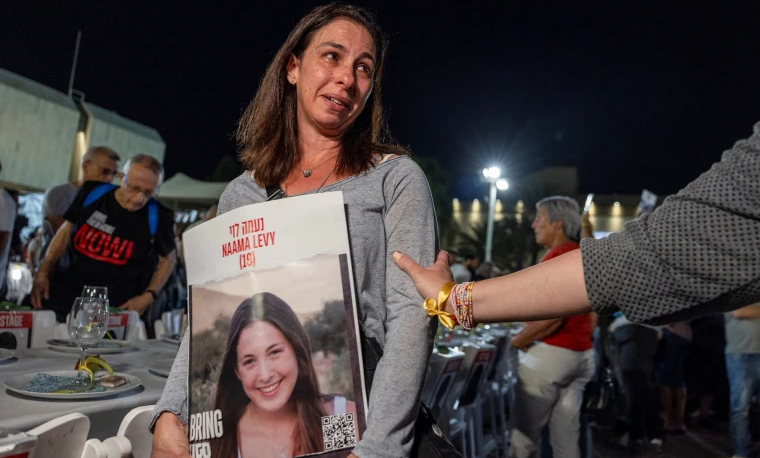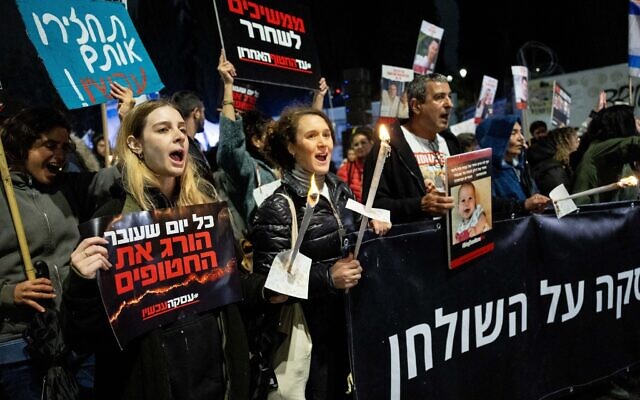The mother of a captive held hostage in Gaza has made an earnest appeal for immediate action to facilitate her son’s release. Her impassioned plea seeks to draw attention to the dire situation her family has been confronted with since the abduction of her son. The grief-stricken woman urges the authorities to expedite negotiations for a deal that could ensure his safe return, emphasizing a desperate need for immediate intervention. She reminds the world of the humanity at the heart of this crisis, as she pleads for her son’s life. Her plea paints a stark picture of the anxiety, despair, and fear that the family has been grappling with.
The mother’s appeal is a poignant reminder of the personal cost of such situations, often overlooked in broader political discourses and strategical considerations. She implores the powers that be to prioritize her son’s safety and wellbeing over any other considerations that may be delaying the negotiation process. Each passing day intensifies the mother’s anxiety, as she awaits news about her son, whose fate hangs in the balance.
She articulates her plea with a heartfelt sincerity that is impossible to ignore. Her words underscore the desperate urgency of the situation and the immense stress on the family. She is not just a mother pleading for her child’s life but also a symbol of countless other individuals who find themselves in similar predicaments. Her plea is a call to action that transcends geographical boundaries and political ideologies, resonating with anyone who values the sanctity of human life.
This desperate appeal also sheds light on the human cost of the ongoing conflict. It highlights the personal stories often buried beneath the headlines and the grim statistics. It is a stark reminder that behind every number is a real person with a family waiting anxiously for their return. As she pleads for her son’s release, she also implicitly calls for a broader push towards peace and resolution.
The mother’s plea is a potent symbol of the anguish and desperation of families torn apart by situations beyond their control. It is a grim reminder of the human reality of conflict and the urgent need for resolution. Every moment matters in these scenarios, and delays can have potentially devastating consequences. The mother’s plea underscores the urgency of the situation and the pressing need for immediate action. It is a reminder to all those in positions of power that their decisions have real, human consequences.
Her plea is not just for her son, but for all hostages, their families, and everyone affected by such crisis. It is a stark reminder of the cost of conflict, the value of human life, and the urgent need for compassion and action. The mother’s plea is a call to humanity to rise above political considerations and do what is necessary to ensure her son’s safe return. Her heartfelt appeal is a reminder to the world that in the face of such adversity, every moment counts, and immediate action is critical.
In conclusion, the mother’s urgent plea serves as a poignant reminder of the human cost of conflict. It underscores the need for immediate action and the value of each human life. It is a call to the world to not forget the individuals caught in the crossfire, their families waiting in anguish, and the pressing need for resolution.

A Mother’s Call for Action
A mother’s call for action is a powerful plea that transcends the boundaries of cultures, societies, and nations. It is a rallying cry that seeks to bring about change, embodying the primal instinct of a mother to protect her children and ensure their well-being. This plea may be in response to a variety of issues – health, education, climate change, social justice, or any other area where she believes her children’s future is at stake.
It is a heart-wrenching appeal that stirs empathy and pushes individuals, communities, and policymakers to reevaluate their priorities, strengthen their efforts, and initiate substantial reforms. The tenacity and resolve of a mother can give a voice to the voiceless, pave the way for discourse, and inspire movements that redefine societal norms and expectations. In the face of adversity, a mother’s call for action serves as a beacon of hope, ushering in an era of transformation and progress. It embodies the spirit of resilience and the relentless pursuit of a better world for her children. Regardless of the magnitude of the challenge or the extent of the resistance, a mother’s call for action resounds with unwavering determination and an unyielding commitment to her cause.
It is a testament to a mother’s unflinching courage and her indomitable will, a testament to the power of love that can move mountains and instigate change. It is this power that drives revolutions, that fosters innovation, that fuels the quest for justice and equality. A mother’s call for action is more than a plea – it is an unstoppable force, a catalyst for change, and an embodiment of the universal truth that love, above all, has the power to transform the world.
Current Status of Negotiations
Currently, the landscape of negotiations is evolving rapidly, influenced by emerging technologies, globalization, and the ongoing COVID-19 pandemic. In both the public and private sectors, negotiations play a crucial role in shaping relationships, agreements, and policies. In the international arena, the status of negotiations often determines the direction of major global issues such as climate change, trade agreements, and peace treaties. For instance, the recent COP26 summit demonstrated how negotiations could lead to significant commitments to lower carbon emissions.
As for the corporate world, negotiations serve as the backbone of business deals, mergers, and acquisitions. Virtual platforms have become the new normal for negotiations due to the pandemic restrictions, bringing both opportunities and challenges. While such platforms offer convenience and cost-effectiveness, they also demand the development of new skills to effectively navigate the digital landscape.
Moreover, the current status of negotiations has become more complex due to the ambiguity and uncertainty in the global economic and political climate. The rising tensions between the world’s major powers, the ever-changing dynamics of the global economy, the increasing awareness of societal issues like racial and gender equality, and the urgency of environmental sustainability, all add layers of complexity to negotiations.
In light of these changes, the process of negotiations is shifting from a competitive, zero-sum game approach towards a more collaborative and integrative one. This shift is driven by the growing recognition that mutually beneficial outcomes are more sustainable and conducive to long-term relationships. Therefore, the current status of negotiations involves a more strategic, flexible, and adaptive approach, with a focus on mutual gains, relationship-building, and conflict resolution.
To conclude, the current status of negotiations is in a state of flux, shaped by various global trends and challenges. However, the essence remains the same – reaching agreements that satisfy the interests and needs of all parties involved.

Humanitarian Implications
Humanitarian implications refer to the potential impact of actions or decisions on the welfare, safety, and fundamental rights of individuals or communities. They are often associated with situations such as conflicts, natural disasters, and global health crises, where the human cost can be significant. Understanding these implications is crucial in informing response measures and interventions aimed at alleviating suffering and ensuring dignity for those affected.
For instance, in the context of a war, the humanitarian implications might include displacement of populations, loss of life, physical injuries, psychological trauma, and disruption of social services like education and healthcare. Similarly, the spread of a pandemic could lead to severe health consequences, economic hardships, and social unrest. Therefore, policies and actions, whether by governments, international organizations, or other actors, must take into consideration these humanitarian implications to ensure the protection and promotion of human rights and dignity.
It is also important to note that the impact may vary across different groups, with children, women, the elderly, and marginalized populations often being disproportionately affected due to their vulnerability. Hence, a comprehensive understanding of humanitarian implications requires a nuanced approach that takes into account the intersectionality of factors such as gender, age, socio-economic status, and ethnicity. Ultimately, the goal should be to mitigate adverse effects, foster resilience, and pave the way for recovery and development.
Political and Diplomatic Dynamics
Political and diplomatic dynamics play a vital role in the global arena, shaping the relationships and interactions between countries. These dynamics involve complex processes of negotiation, communication, and decision-making, which define the course of international relations. Traditionally, the sphere of politics and diplomacy has been dominated by state actors. However, with the advent of globalization, non-state actors, such as international organizations, multinational corporations, and civil society groups, have gained increasing influence, adding to the complexity of these dynamics.
The political dynamics often revolve around power struggles, strategic alliances, policy-making, and governance, with each nation striving to safeguard its interests and assert its influence on the global stage. These dynamics can greatly influence the direction of national and international policies, the allocation of resources, and the overall trajectory of countries. They are also closely intertwined with economic, social, and environmental factors, which can simultaneously influence and be influenced by political dynamics.
On the other hand, diplomatic dynamics involve the delicate art of managing relationships between countries, often through dialogue, negotiations, treaties, and international conferences. Diplomatic dynamics are crucial in maintaining peace, resolving conflicts, and fostering cooperation among nations. They require tact, finesse, and a deep understanding of cultural nuances, geopolitical realities, and global trends. Diplomacy has evolved significantly over the years, with the rise of public diplomacy, digital diplomacy, and track-two diplomacy, among others.
In the rapidly changing global landscape, the interplay between political and diplomatic dynamics is becoming increasingly intricate. The rise of emerging powers, the proliferation of digital technologies, and the mounting global challenges, such as climate change, pandemics, and terrorism, are reshaping these dynamics. Understanding these dynamics is crucial for policymakers, diplomats, scholars, and anyone interested in international relations. It can provide valuable insights into the forces that shape the global order, the strategies that countries adopt to navigate the international system, and the potential pathways to a more peaceful, equitable, and sustainable world.

Public and Media Reactions
Public and media reactions often play a critical role in shaping societal narratives and influencing policy-making decisions. These reactions, whether they are in response to political developments, social issues, or economic trends, can significantly impact public opinion and drive collective action. The media, with its expansive reach and influence, serves as a powerful platform for sparking discussions and debates, raising awareness, and prompting change. Public responses, on the other hand, reflect the pulse of the society, demonstrating people’s attitudes, perceptions, and sentiments towards various issues.
Media reactions often set the tone for public discourse, with news reports, editorials, and social media posts shaping how events are perceived and understood. They can either amplify or downplay certain issues, highlight different perspectives, or even incite or soothe tensions. Media reactions can also impact the actions of key decision-makers, as they may feel compelled to respond or adjust their strategies based on media coverage.
Public reactions, meanwhile, are an essential barometer of societal attitudes. They can serve as a catalyst for change, pushing for reforms or advocating for certain causes. They can also provide feedback to decision-makers, indicating whether their actions are resonating with the wider society or not. Public reactions can take various forms, from peaceful protests and petitions to online campaigns and boycotts.
However, it’s important to note that both public and media reactions are subject to various influences and biases. While they can certainly contribute to positive change and progress, they can also lead to polarization, misinformation, and conflict if not approached with care and responsibility. Therefore, it’s crucial that media organizations uphold journalistic ethics and standards, and that the public stays informed and critical in their consumption and reaction to media content.
